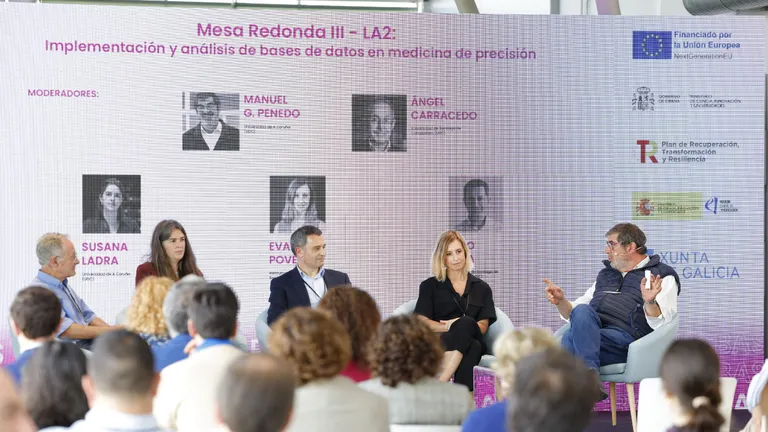Researchers Susana Ladra and Ana López Cheda are in charge of both projects.
The researchers from the University of A Coruña (UDC) Susana Ladra and Ana López Cheda lead the Datamicroccr and Mcsicar projects, focused on the study of the microbiome and breast cancer, respectively. The research lines, framed within the Complementary Plan for Biotechnology Applied to Health (PCBAS), are not the only ones in which the University of A Coruña will participate; it will also collaborate in a secondary way in two others (Nidoa and Inmunomacs-pro).
Coordinated in Galicia by the Kaertor Foundation and with a budget of 3 million euros, the plan includes 15 innovative projects, in which various Galician universities and health research institutes are participating. All lines of research are funded by the Regional Ministry of Education through the Galician Innovation Agency (Gain) and have NextGenerationEU funds.
The aim of the programme is to develop, in coordination with universities and research centres, new diagnostic tools and advanced therapies, as well as to promote personalised medicine.
Algorithms and microbiome
Susana Ladra, teaching staff and researcher at the University of A Coruña, will carry out the Datamicroccr project in collaboration with the Biomedical Research Institute of A Coruña (Inibic). The research focuses on the development of bioinformatics tools and algorithms to analyse samples and clinical data to study the influence of the microbiome on the response to treatment of colorectal cancer.
The microbiome, which refers to the set of genomes of micro-organisms in the human body, can be altered by various risk factors, such as lifestyle or diet. This set of genomes influences the development and evolution of pathologies such as cancer. Through the project’s analysis of the data, it is possible to discover which bacterial populations are beneficial or detrimental in the development and treatment of this cancer variant.
Cardiac toxicity under scrutiny
Ana López Cheda, a researcher at the Centre for Research in Information and Communication Technologies (Citic), heads the Mcsicar research line, also in collaboration with Inibic. This project aims to improve the quality of life of cancer patients, more specifically those diagnosed with HER2+ subtype breast cancer.
So far, treatments targeting the HER2 protein have contributed to disease survival; however, they can cause side effects such as cardiovascular toxicity. This research focuses on predicting, through statistical methods, the appearance of this harmful effect, thus making it possible to estimate a patient’s probability of developing this side effect, the period of greatest risk and the factors that influence its development.
The UDC is also participating in two other projects: Nidoa, led by the Novoa Santos Foundation and aimed at discovering new DPP4 inhibitors for the treatment of osteoarthritis, and Inmunomacs-pro, coordinated by the Galician Public Foundation Health Research Institute of Santiago de Compostela (Fidis), which focuses its studies on the drug screening platform and the analysis of drug-drug interactions.
Original news: La Universidade da Coruña encabeza dos líneas de investigación de biotecnología para la salud – lavozdegalicia.es (25/08/2024).
For BIOGA, it is a priority to promote intersectoral collaboration with other entities and to promote national and international networking activities. If you want to know more about us, please visit the following link.
- Galicia created 13% of the biotech firms born in Spain in 2023 and consolidates its position among the most bio-entrepreneurial autonomous communities
- Medrar, the company that helps the countryside to grow
- Enzicas: maturation based on enzymes and chestnuts
- Biotechnology holds a prominent role in the policy directions for the next European Commission 2024-2029
- CEAMSA presents its FABRINTYSO project, smart and sustainable production to boost industrial competitiveness
- The Zendal Group launches the 5th edition of its International Zendal Awards for human and animal health projects.
- Hijos de Rivera beats on quantum computing and AI to research flavors of the future
- Galicia Biodays hosted more than 800 ‘one to one’ meetings
- Vigo, capital of biotechnology
- Bioga joins ACESABIO, the largest Spanish alliance in health and biosciences representing a dozen clusters and more than 1,000 entities

